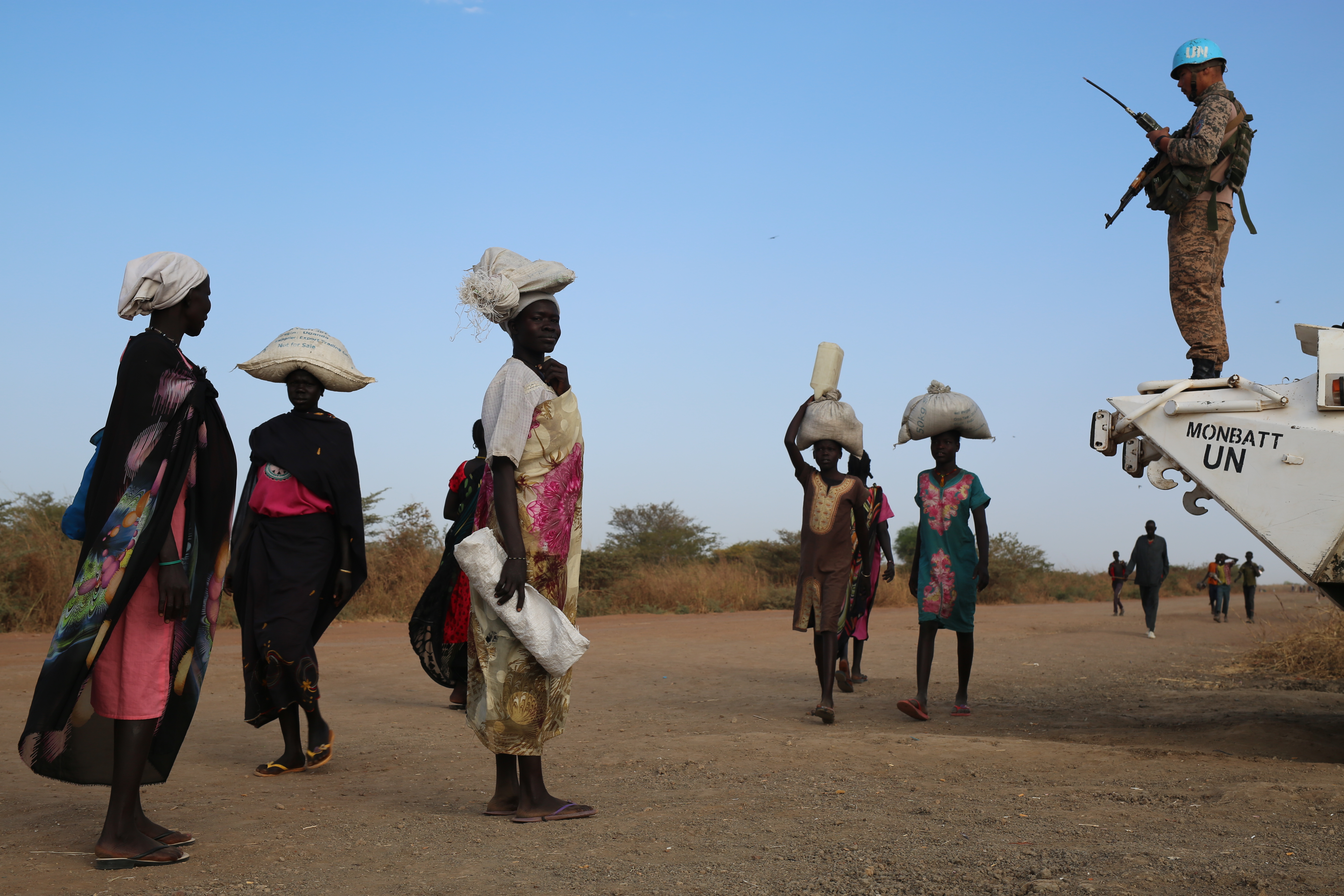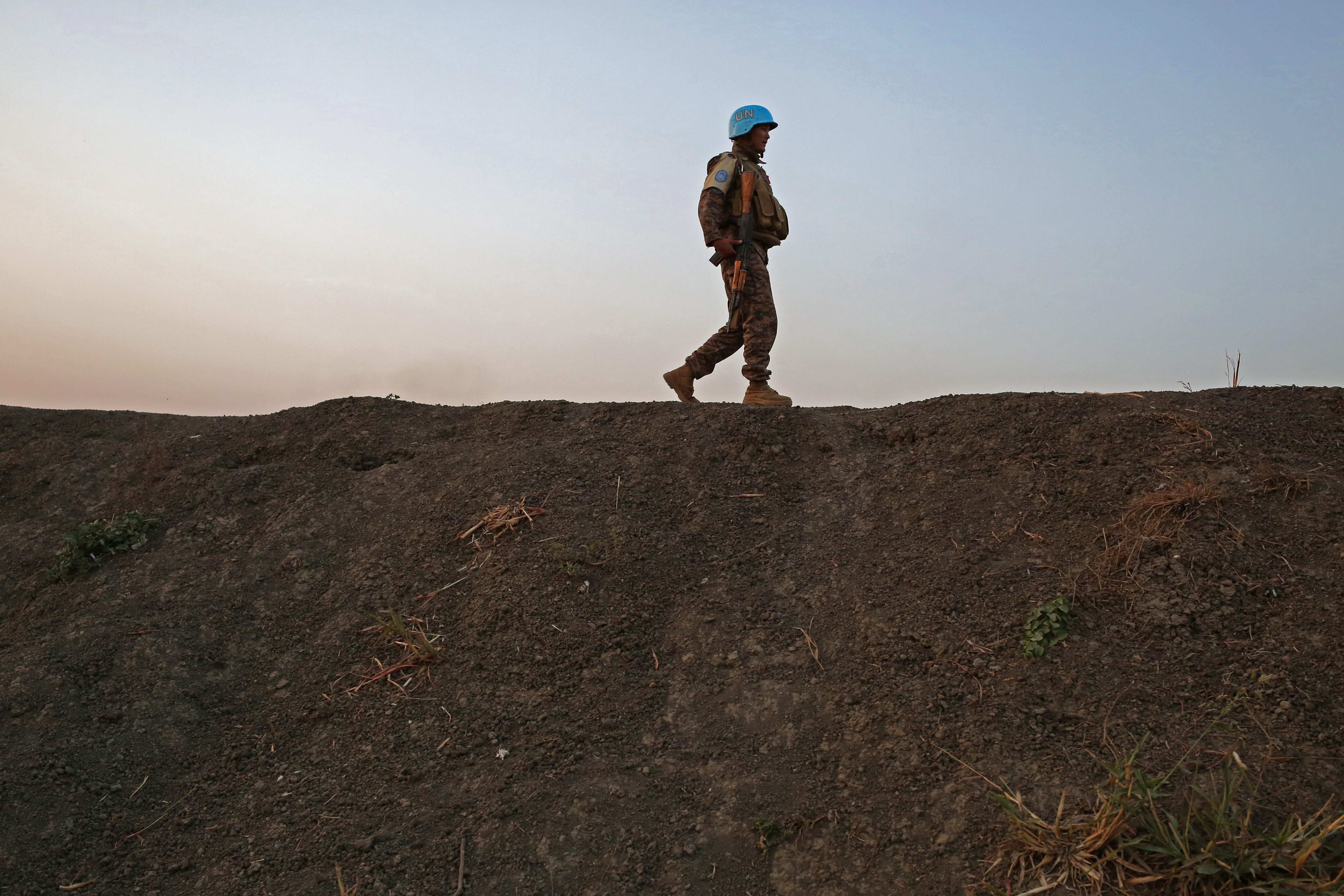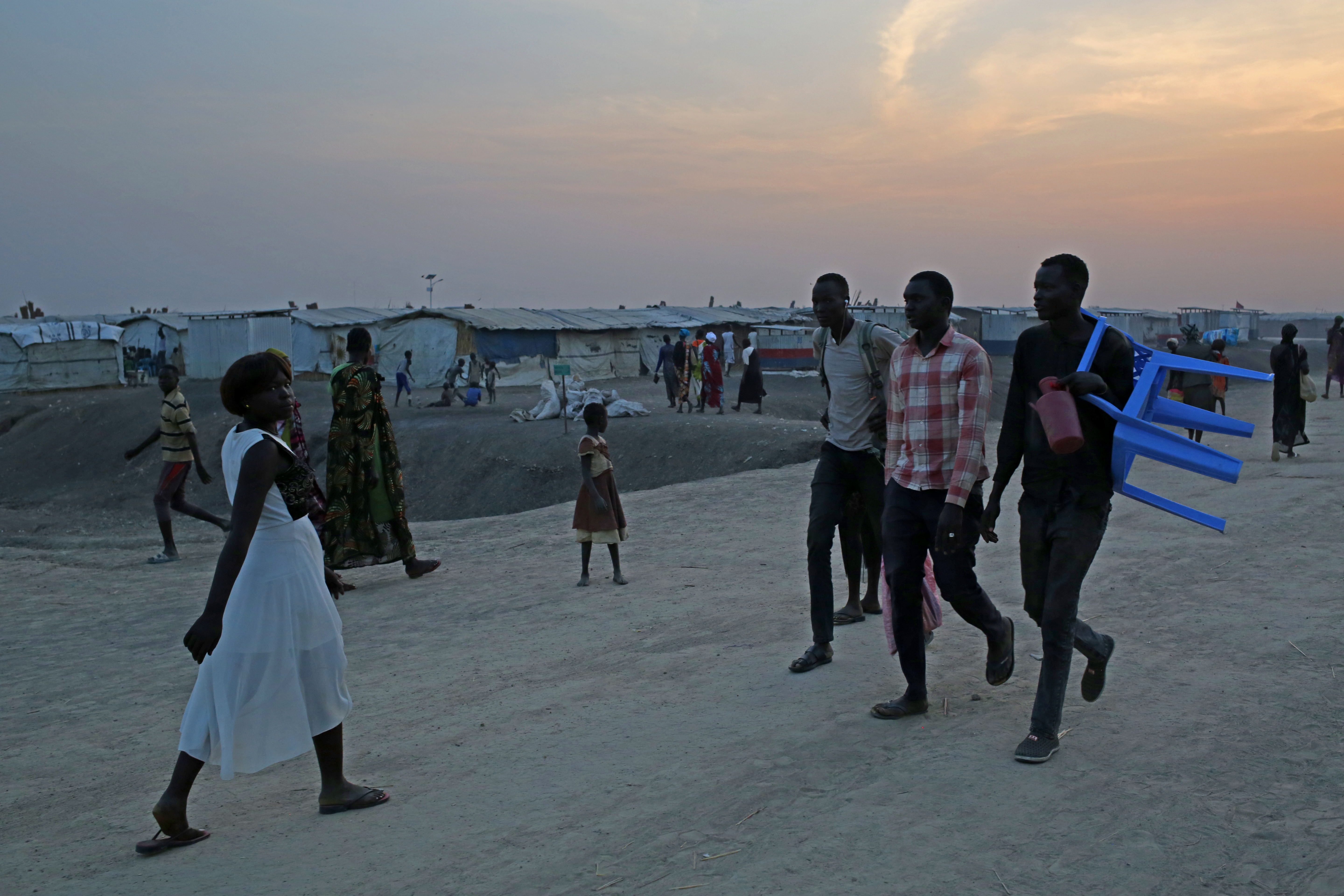BENTIU, SOUTH SUDAN — The road to safety was anything but.
Cecilia’s father had sent her away from their village in Leer county, thinking it might save her. They’d managed to survive South Sudan’s civil war by hiding in the bushes as soldiers ravaged their surroundings.
“They killed civilians and raped women,” Cecilia, now 17 years old, says of the fighters. “They burned down everything, including our homes. Those found in the house got burned inside.”
Many of her neighbors had fled to a United Nations base in the northern town of Bentiu amid a recent escalation in fighting, but Cecilia had stayed with her disabled father, who was unable to make the three-day journey by foot.
But eventually, he insisted she go, fearing that she would be raped or killed if she continued to stay. So she set out with her husband and several others for the base. They didn’t make it far.
“We found soldiers on the road,” she says matter-of-factly. “They released all the men and took girls and women into the bush for rape. Even if you cried, they kept pulling you into the bush.”
One fighter grabbed Cecilia by the legs and dragged her onto a patch of grass, then beat her on her back and arms.
“After some minutes he raped me,” the teen says, cracking her gum.
She remembers how he reeked of alcohol and wore filthy black pants with a green racing stripe down the side. She also remembers the chilling warning he issued when he finished.
“He told me to stand up and walk away after he raped me,” she says. “He told me, you Nuer will see, you think [the base] is the safer place.”
That reference to Nuer—Cecilia’s ethnic group—underscored how specific ethnicities are being targeted in South Sudan’s civil war. The conflict has raged for nearly five years, pitting forces loyal to President Salva Kiir, a Dinka, against supporters of former vice president Riek Machar, a Nuer. More than 50,000 people have been killed and more than three million driven from their homes by the fighting. The U.N. has warned of the potential for a genocide.
Both sides have been accused of atrocities, from mass killings to ethnically targeted violence. Mass rape has also been a horrific hallmark of the conflict, with the U.N. saying it is occurring on an “epic” scale. The U.N. says that sexual violence, already widespread in South Sudan before civil war erupted in late 2013, has increased at least five-fold in recent years. And a study released in November of 2017 found that violence against women and girls in the country is double the global average.
Those numbers shed light on what is almost the sense of inevitability about rape expressed by Cecilia and many others—one that could be changing how South Sudanese talk about rape among themselves and inside of families.
Rape has long carried a weighty and even dangerous stigma in South Sudan. But women and men alike at the U.N. base in Bentiu where Cecilia sought safety spoke of it without prompting. Each person among the 120,000 crowded there can rattle off a story, a name, or all too often a list of names. They would speak knowingly and in detail, though few would openly name themselves as survivors. One woman who’d agreed to share her personal story of surviving rape would not say “I” but rather “this woman” when interviewed about her experience.
Men, too, speak of the scourge. One young man—who asked to be identified by his first initial, G.—recounted seeing a young girl gang raped by three male soldiers. And he was certain his sister had her own horror story.
“People talk about rape but they don’t finger point,” G. says. “My own sister was abducted but she cannot accept to talk to me. She can not say what happened to her.”
That’s because stigmatization is a real problem which can be traumatizing and isolating for survivors, says Pamela Tuyott, the women’s protection and empowerment coordinator for the International Rescue Committee, a global humanitarian aid organization.

(Photo: Cassandra Vinograd)
“They are talking but people will not normally [disclose when they] speak out,” Tuyott says. “People can talk about rape—and generally people talk about rape in the community—but oftentimes it’s not about identification of survivors.”
By contrast, Cecilia didn’t think twice about telling her husband that she was raped. He offered reassurance and support, not stigma.
After she was assaulted Cecilia recalled laying on the ground, unable to get up. When she did she could barely walk; her body was torn.
“I felt weak with a lot of pain,” she says. “It was rough sex…. It cannot be compared like when you do it with your husband.”
She made her way back onto the road, hobbling. After some time Cecilia came across her husband, who with the other men had gone just far enough out of sight to wait and see if the women re-emerged. She immediately told him what had happened.
“I told my husband that I am raped because this is a forced violence,” she says. “He told me to take heart—that this is the situation of war. It is good they have not killed you.”
“They could have killed us,” she adds. “It is better that they raped us and now it is good we are still alive.”
Cecilia’s decision to tell her husband wasn’t unique in Bentiu. Several other women interviewed say they’d shared their stories with relatives or even neighbors.
What that means for the broader reduction of stigma, or if the conversation is truly changing, is hard to say, says Jehanne Henry, a senior researcher in Human Rights Watch’s Africa Division.
In some cases survivors might be willing to speak out because they’ve been encouraged to or given permission to by their community, Henry says. Other instances might reflect a push by non-governmental organizations and the international community to raise awareness about the prevalence of sexual violence and the importance of reporting it.

(Photo: Cassandra Vinograd)
Still, it’s hard to generalize across the country—it really depends on the community, the local conflict dynamics, and societal variables.
“There’s huge stigma around this,” Jehanne says. “It’s pretty widespread, this idea that you can be spoiled and that it’s shameful.”
Eighteen-year-old Martha does consider herself spoiled—referring to her dignity—and she’s not ashamed or afraid to speak out.
“There is nothing that I am scared of telling you,” she says firmly one December afternoon, holding the 10-month-old baby borne out of her rape.
Martha remembers the exact date that the men came to her town of Rubkway: It was early afternoon on May 17th, 2015, and she hadn’t yet eaten lunch. Martha was wearing her white dress, playing with her niece on the ground when a group of armed fighters appeared. One cocked his gun, pulled the child away from her and dragged Martha to her feet. He hit her repeatedly then marched her away with a gun pointed to her back.
“He told me if I run away he will kill me,” she says.
She was marched along with many other women from the village—”pregnant mothers and breastfeeding mothers” among them—to an abandoned market. They arrived in the early evening. There, the man who’d first grabbed Martha threw her down on the hard gravel and raped her.
“I felt pain on my back because the ground was too rough,” Martha says. “After he raped me, he didn’t speak to me.”
She says she waited until her attacker fell asleep and escaped at around 4 a.m., fleeing in her white dress, now torn and dotted with blood from the violent assault.
When she later realized she was pregnant, Martha despaired. “I thought of aborting the child,” the devout Christian says, describing how she sought medical help at the nearest U.N. base—still wearing that same dress.
But by then she was more than five months pregnant and “the child was too big to get out,” Martha explains.

(Photo: Cassandra Vinograd)
She delivered the baby in January; the child is severely impaired. Martha cares for him in a dark hut in the crowded Bentiu camp. The torn dress is rolled in a ball under her mat in the corner.
“I kept the cloth but do not wear it ever again,” she says as the baby drools.
Martha has told her sisters what happened; she knows hers is not the sole story of surviving sexual violence. Still, she considers herself particularly “unlucky” because she became pregnant. But she holds out hope of getting married one day, finding a man who will care for them both.
Martha’s voice never wavers when recounting the details of her rape, how she still feels pain in her back from that gravel. And it gathers strength when she is asked what she thinks of her attacker.
“If I see him, I would tell the community about him—that this is a man who spoiled me,” she says, driving her index finger into the mattress she’s seated on. “Aggressiveness will not help me—but the only thing that could be done to this man is punishing him.”
Reporting for this story was supported by a grant from the Pulitzer Center on Crisis Reporting.




